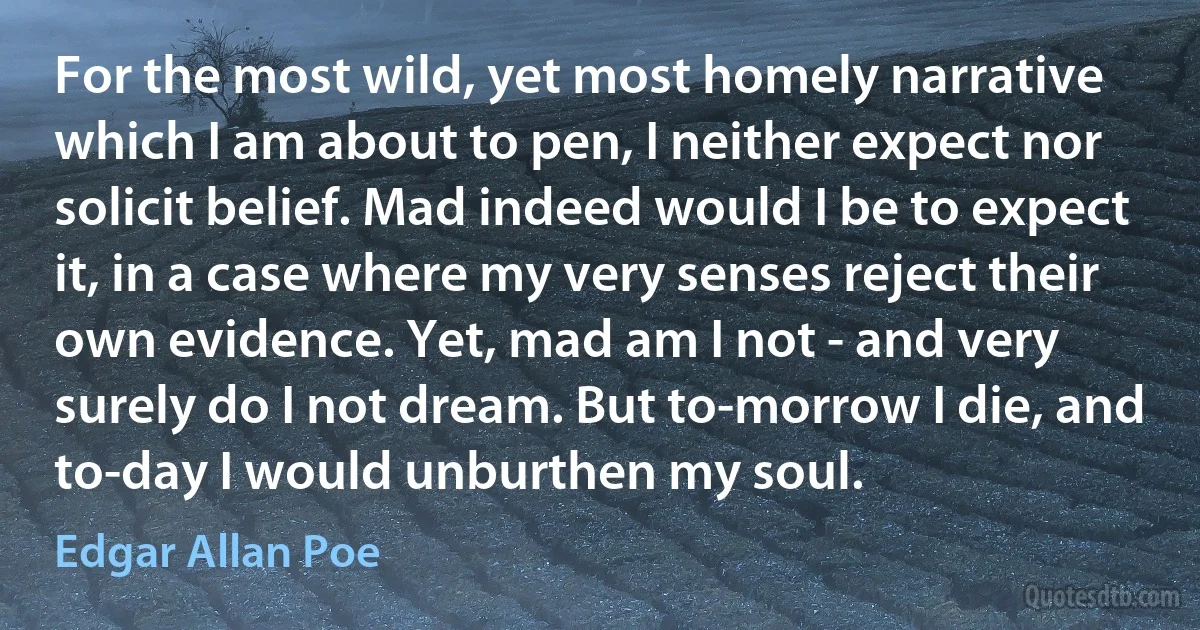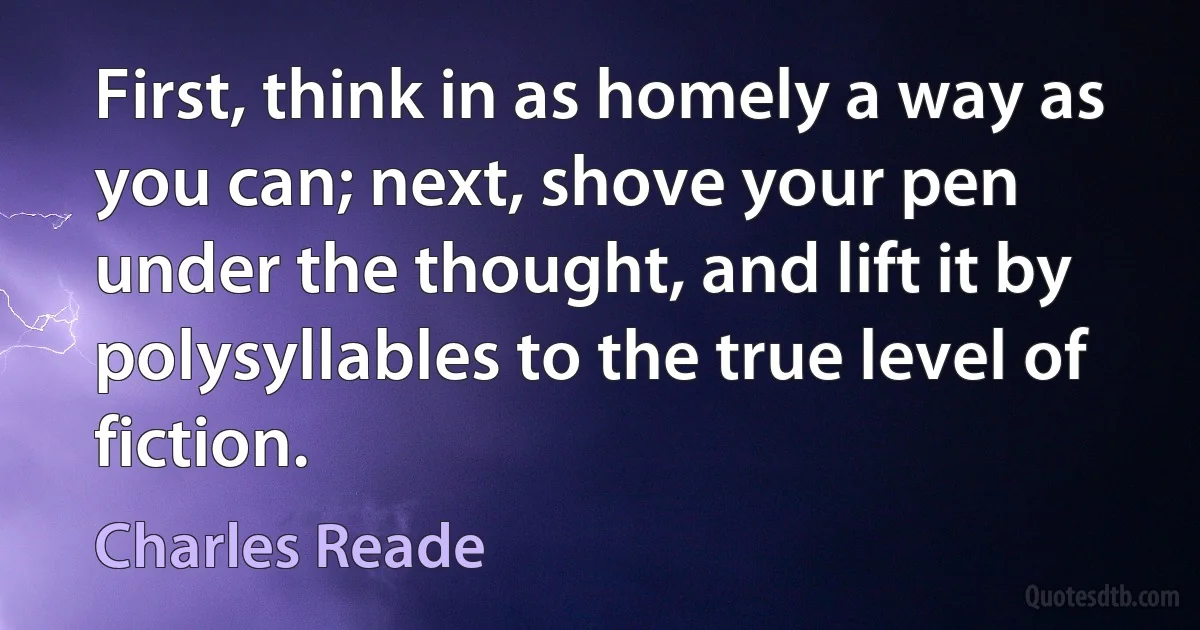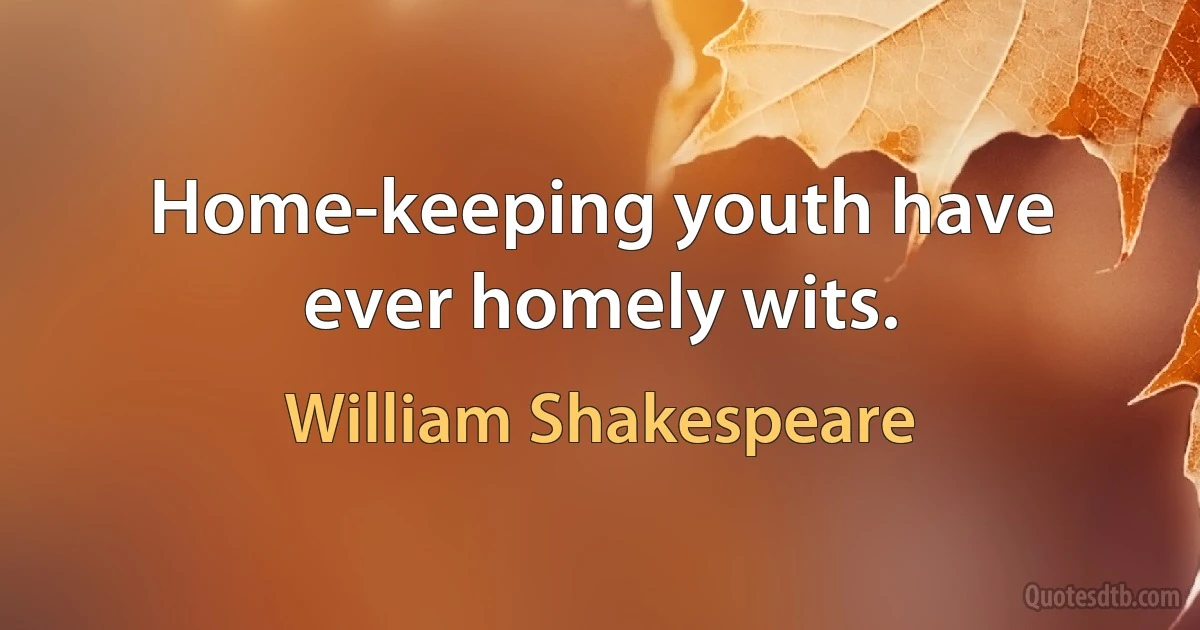Homely Quotes - page 2
Mark at present so much; what the essence of Scandinavian and indeed of all Paganism is: a recognition of the forces of Nature as godlike, stupendous, personal Agencies,-as Gods and Demons. Not inconceivable to us. It is the infant Thought of man opening itself, with awe and wonder, on this ever-stupendous Universe. To me there is in the Norse system something very genuine, very great and manlike. A broad simplicity, rusticity, so very different from the light gracefulness of the old Greek Paganism, distinguishes this Scandinavian System. It is Thought; the genuine Thought of deep, rude, earnest minds, fairly opened to the things about them; a face-to-face and heart-to-heart inspection of the things,-the first characteristic of all good Thought in all times. Not graceful lightness, half-sport, as in the Greek Paganism; a certain homely truthfulness and rustic strength, a great rude sincerity, discloses itself here.

Thomas Carlyle
What a thing it is to lie there all day in the fine breeze, with the pine needles dropping on one, only to return to the hotel at night so hungry that the dinner, however homely, is a fete, and the menu finer reading than the best poetry in the world! Yet we are to leave all this for the glare and blaze of Nice and Monte Carlo; which is proof enough that one cannot become really acclimated to happiness. (10 September 1902) in the village of Cavalaire, France.

Willa Cather
Our courteous Lord willeth that we should be as homely with Him as heart may think or soul may desire. But beware that we take not so recklessly this homeliness as to leave courtesy. For our Lord Himself is sovereign homeliness, and as homely as He is, so courteous He is: for He is very courteous. And the blessed creatures that shall be in heaven with Him without end, He will have them like to Himself in all things. And to be like our Lord perfectly, it is our very salvation and our full bliss.

Julian of Norwich
Mine understanding was lifted up into Heaven where I saw our Lord as a lord in his own house, which hath called all his dearworthy servants and friends to a stately feast. Then I saw the Lord take no place in His own house, but I saw Him royally reign in His house, fulfilling it with joy and mirth, Himself endlessly to gladden and to solace His dearworthy friends, full homely and full courteously, with marvellous melody of endless love, in His own fair blessed Countenance. Which glorious Countenance of the Godhead fulfilleth the Heavens with joy and bliss.

Julian of Norwich
Man is blinded in this life and therefore we may not see our Father, God, as He is. And what time that He of His goodness willeth to shew Himself to man, He sheweth Himself homely, as man. Notwithstanding, I reason, in verity we ought to know and believe that the Father is not man.

Julian of Norwich
The natural property of dread which we have in this life by the gracious working of the Holy Ghost, the same shall be in heaven afore God, gentle, courteous, and full delectable. And thus we shall in love be homely and near to God, and we shall in dread be gentle and courteous to God: and both alike equal.

Julian of Norwich
I saw that homely and sweetly was this shewed, and that the age of every man shall be known in Heaven, and shall be rewarded for his willing service and for his time. And specially the age of them that willingly and freely offer their youth unto God, passingly is rewarded and wonderfully is thanked.
For I saw that whene'er what time a man or woman is truly turned to God, - for one day's service and for his endless will he shall have all these three decrees of bliss. And the more the loving soul seeth this courtesy of God, the liefer he is to serve him all the days of his life.

Julian of Norwich
O God methinks it were a happy life, To be no better than a homely swain To sit upon a hill, as I do now, To carve out dials, quaintly, point by point, Thereby to see the minutes how they run, How many make the hour full complete How many hours bring about the day How many days will finish up the year How many years a mortal man may live.

William Shakespeare
The second doctrine of the Perennial Philosophy - that it is possible to know the Divine Ground by a direct intuition higher than discursive reasoning - is to be found in all the great religions of the world. A philosopher who is content merely to know about the ultimate Reality - theoretically and by hearsay - is compared by Buddha to a herdsman of other men's cows. Mohammed uses an even homelier barnyard metaphor. For him the philosopher who has not realized his metaphysics is just an ass bearing a load of books. Christian, Hindu, Taoist teachers wrote no less emphatically about the absurd pretensions of mere learning and analytic reasoning.

Aldous Huxley
This poet is now, most of the time, an elder statesman like Baruch or Smuts, full of complacent wisdom and cast-iron whimsy. But of course there was always a good deal of this in the official rôle that Frost created for himself; one imagines Yeats saying about Frost, as Sarah Bernhardt said about Nijinsky: "I fear, I greatly fear, that I have just seen the greatest actor in the world.”
Sometimes it is this public figure, this official rôle - the Only Genuine Robert Frost in Captivity - that writes the poems, and not the poet himself; and then one gets a self-made man's political editorials, full of cracker-box philosophizing, almanac joke-cracking - of a snake-oil salesman's mysticism; one gets the public figure's relishing consciousness of himself, an astonishing constriction of imagination and sympathy; one gets sentimentality and whimsicality; an arch complacency, a complacent archness; and one gets Homely Wisdom till the cows come home.

Randall Jarrell
All his tunk-a-tunks, his hoo-goo-boos - those mannered, manufactured, individual, uninteresting little sound-inventions - how typical they are of the lecture-style of the English philosopher, who makes grunts or odd noises, uses homely illustrations, and quotes day in and day out from Alice, in order to give what he says some appearance of that raw reality it so plainly and essentially lacks. These "tootings at the wedding of the soul” are fun for the tooter, but get as dreary for the reader as do all the foreign words - a few of these are brilliant, a few more pleasant, and the rest a disaster: "one cannot help deploring his too extensive acquaintance with the foreign languages”, as Henry James said, of Walt Whitman, to Edith Wharton.

Randall Jarrell



